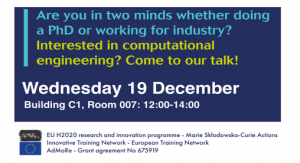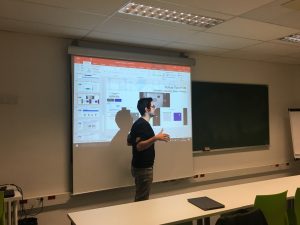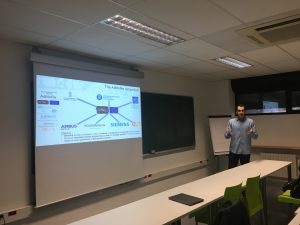Similarly to Guillem and Marcos also me, Luca and Rubén organized a talk entitled “PhD in industry: overview of the AdMoRe project” as part of the outreach activities of the  AdMoRe project. The talk was given on 19th December 2018 at Universitat Politècnica de Catalunya (UPC), one of the academic partners of the AdMoRe project, and was addressed to master students. The talk was advertised through e-mails sent to the students and through messages posted in the LaCaN (the research group involved in the AdMore project and locate in the Universitat Politècnica de Catalunya) webpage and in screens located at the entrance of UPC.
AdMoRe project. The talk was given on 19th December 2018 at Universitat Politècnica de Catalunya (UPC), one of the academic partners of the AdMoRe project, and was addressed to master students. The talk was advertised through e-mails sent to the students and through messages posted in the LaCaN (the research group involved in the AdMore project and locate in the Universitat Politècnica de Catalunya) webpage and in screens located at the entrance of UPC.
The goal of the talk was to give an overview of our project as well as talk about our experience as PhD in a way that could be understood by people that were not necessarily experts in the fields of our research.
After presenting ourselves and our educational background, we first explained how we ended up doing a PhD in a foreign country (France for Rubén, France and Spain for me and Spain and UK for Luca) and the reasons that brought us to take this decision. In fact we explained as our project is a Marie Sklodowska-Curie Innovative Training Network funded by the European Union Horizon 2020 research and innovation program and one of its  objectives is also to promote the mobility of young researchers. Many of the students in the talks were international students, exactly as me, Rubén and Luca when we enrolled the Erasmus program during our master, so that they probably felt close some of the motivations we gave: the possibility to make new experiences abroad, to learn new cultures and languages, among the others. These ‘personal’ motivations were also a good incentive to the Spanish students in the room that didn’t live an experience abroad yet.
objectives is also to promote the mobility of young researchers. Many of the students in the talks were international students, exactly as me, Rubén and Luca when we enrolled the Erasmus program during our master, so that they probably felt close some of the motivations we gave: the possibility to make new experiences abroad, to learn new cultures and languages, among the others. These ‘personal’ motivations were also a good incentive to the Spanish students in the room that didn’t live an experience abroad yet.
We also gave more ‘practical’ motivations as the possibility to make research closely to industry. In fact we explained as the AdMoRe project involves academic and industrial partners and as each of us has two academic and one industrial institution, so the problems that we are trying to solve during our PhD, using reduced order modeling, are closely related to industrial needs. This aspect is interesting for aspiring PhD students since at the end of their PhD they will be ready to continue their careers both in industry and academy. We explained for this reason our particular projects and the needs of our industrial partners in a simple way, showing them some nice pictures and videos.
Last but not least we also explained as the Marie Sklodowska-Curie grants are higher compare to many other PhD grants, with part of the money reserved for mobility and family allowance (in the case someone has already one) and this give you the possibility to make research, living abroad and attends conferences without particular economic problems.
We then finished the talk giving some indication on how to apply for internship and PhD positions with both our academic (Ecole Centrale de Nantes and Universitat Politècnica de Catalnuya) and industrial partners (ESI Group and Volswagen) focusing the attention in particular on the positions related to European projects, as well as to apply directly through the European Commission webpage.
The talk was very interactive and we answered to many questions related to both our personal experiences and to how to apply for PhD, in particular about the different deadlines and the waiting time between the online application, the different stages of the selection and the final supervisors decision.
